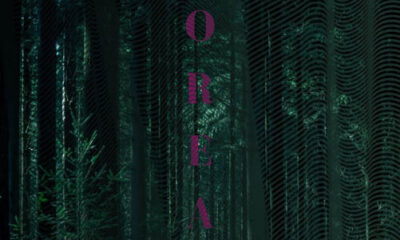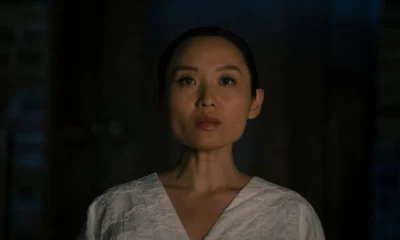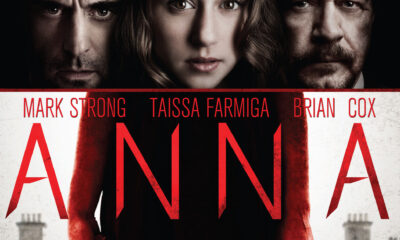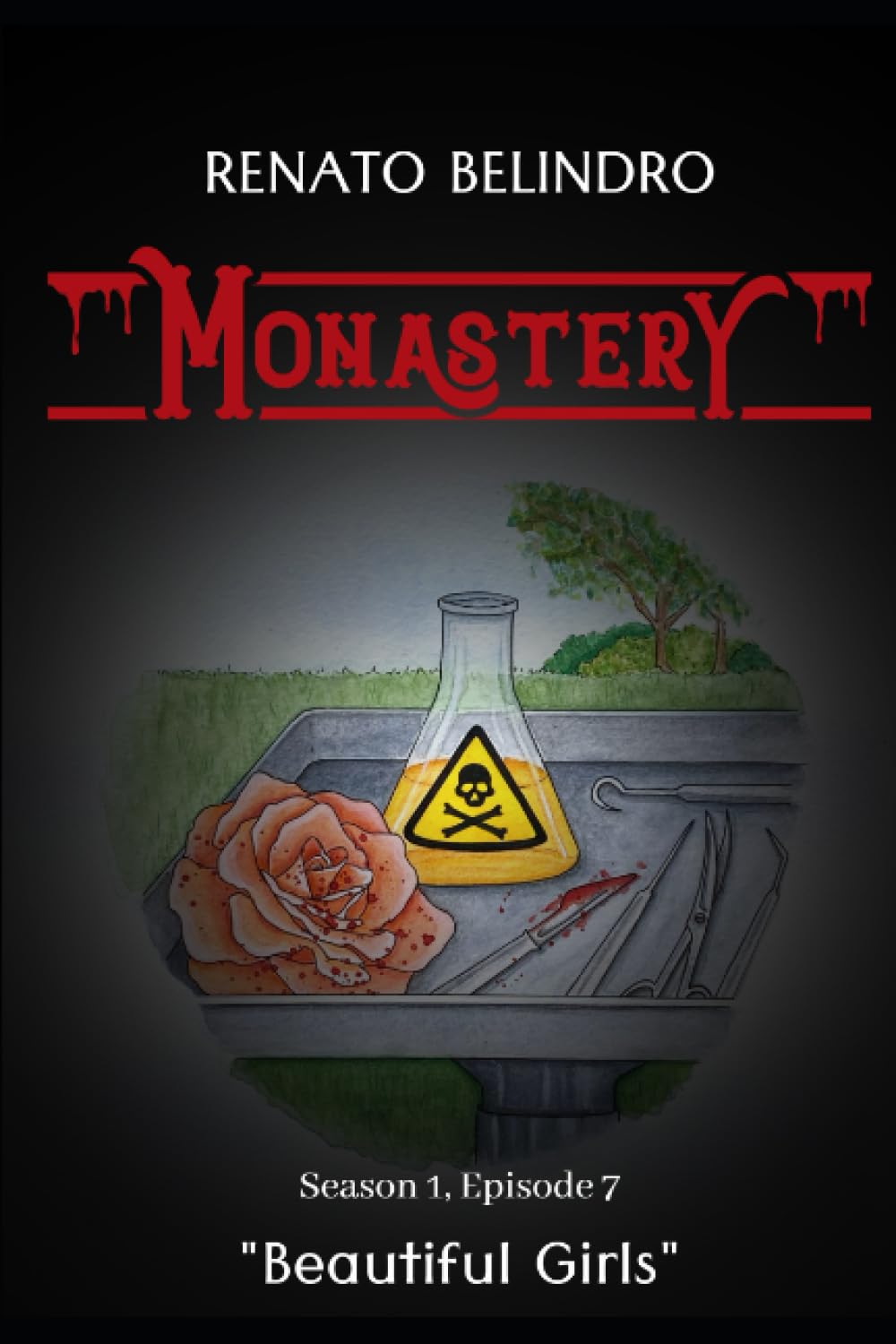
Monastery Series 7: a Book Review
Hello again dear readers. Today we are looking at yet another instalment of Monastery. Once again, I’ll be eating my words. Every time I think the story can’t get any crazier, it does and you’ll understand why soon enough. Without further ado, let’s go!
Plot
We start with quite a tension point in the story (then again, it is always tense nowadays). Rocky’s been abducted and the gang is at a loss for words or motivation, all except Thomas, that is. At this point, all they want is to get Rocky back, even if it means abandoning the search for truth. I can appreciate how Thomas is now a foil not only to those hiding secrets but also to his cousins. Without him, there is no story as far as I’m concerned. However, there were some moments where even I thought he could’ve been a bit more tactful around others’ emotions.
We also see that at least for the time being, Rocky is safe. His POV is so well done I wanted to pull him out of the page and give him a big cuddle. Unfortunately, it looks like he’s yet another collateral damage of the family’s mess.
Speaking of mess, Cassandra and Francis reach a fascinating opposing point. She’s concerned Francis is showing no remorse over killing George Turner, or over killing an innocent dog. Could Albert please ask around if there is a special circle of hell for people like him? It’s interesting how Cassandra, no matter how messed up she is, still has some sense of right or wrong. As for Francis, someone needs to take that gun off him ASAP as he’s all too happy using it.
As we all predicted, the Nicole-David-Fred love triangle finally blew up, and boy, how did it. Erica goes full-on scorned woman and drugs Nicole. She then parades her in the middle of Monastery for everyone to see in a wedding dress. Threatening to pour acid on her face is just an added touch to the terror.
Although this turns out to be just a mind game on Erica’s part, we get some insightful character revelations. Nicole’s reasoning for toying with the two guys becomes more understandable, although I still cannot excuse it (and I’m speaking as someone who actually likes Elena Gilbert). I think she could use some therapy to sort out the trauma inflicted by her dad’s affair. At this stage of her life, she shouldn’t end up with either guy. David is also at fault and I think he should work on making it up to Fred. If he and Nicole sail off into the sunset now, it would leave a bad taste in a lot of reader’s mouths. Then again, if Fred does decide to take her back, it would be his choice. Something tells me this ordeal is far from over.
We end series seven of Monastery with Thomas receiving yet another blow when his dad betrays him and destroys all the progress of their investigation. So much for trusting family, or authorities for that matter. What is going to happen now?
Overall thoughts
I said a lot of my thoughts while discussing the plot of the episode. As usual, Monastery is full of of drama, mystery, and outright terrifying things to keep us on our toes. The one plot thread I am holding in my hand just waiting to see where it leads me is Madam Witch. Her very fairytale-like deal with Cassandra implies she owes her one of the grandkids. Not to mention the implication that Henry has some kind of special powers. I can’t wait to see how that ties into what happened to Albert. The next part can’t come out soon enough!
 (5 / 5)
(5 / 5)
More thoughts from the author:
1. Something I talked about before in another article about Monastery a little but something that I picked up on in this episode. Cassandra, although definitely not perfect, still seems to uphold some kind of morality within her. Such as how horrified she is when Francis doesn’t feel bad that he killed George. Was this something you considered when writing these characters, someone who’s not afraid to get their hands dirty but still has some kind of empathy vs someone who doesn’t?
Absolutely – that is my favourite type of character! Who doesn’t love an anti-hero with a grey moral compass, but a moral compass nevertheless? Cassandra is capable of the most atrocious acts, but she always has her family’s best interest at heart – or what her idea of their “best interest” should be.
Interestingly enough, we’re slowly learning how Francis is the result of Cassandra being the way she is, and he himself certainly blames her for much. Francis only has his own interest at heart… yet he killed George because of what the old creep had said about Cassandra! Again, grey area.
2. The whole Erica scene is genius on many levels. I actually got a couple of questions in regards to it. One – were you always going to pull the whole ‘none of the torture devices were real’ trick on the readers to toy with their emotions or were you thinking of doing it for real but backed out? Two – I thought the way the town’s residents acted was very fitting of the story and of modern society. What was your intention with having seemingly everyone witness the ordeal?
Funny, I cannot remember whether that mini-twist was always part of the equation, but I concluded that I didn’t want Erica to be hated or irredeemable – I wanted to make it more about the lesson being learned than the payback.
As for the townspeople witnessing the whole thing, there were three reasons I did it: a) the satire, because, has mentioned in previous Q&As, Monastery is a satire of small-town life, and we all know small-town folks love a good scandal; b) the humour, as I went all out in making an over-the-top situation even more over-the-top; and c) plot convenience because, as that all goes down, Francis is shooting up the Keane house and I didn’t actually want any neighbours to know and call the cops as it wouldn’t serve his arc… at this point.
3. The one storyline that I’m still wondering as to how it will tie into everything is Madam Witch and the whole first-born son hints that are very fairytale-like. Are we meant to take it as an allusion to the paranormal in this story (such as the seances they had in the previous episode) and that more is coming? As it is not outright stated since the murder mystery is the forefront with the town not really caring there’s a werewolf roaming around.
There will be a paranormal twist to the murder mystery and how it’s covered up, I promise – after all, one mustn’t forget that Cassandra owes Madam Witch – but we don’t know what she owes her for.
As for the werewolf, hmm… Been a while since he’s made an appearance, has it not? Wouldn’t it be a darn shame if one of our protagonists came face-to-face with him in the next episode?
Book Reviews
A Stellar Debut Novel, We Used To Live Here
Imagine this. You’re home alone, waiting for your partner to return, when you hear a knock on your door. You answer it to see a family of five, bundled up against the cold. The father, a kindly older gentleman, explains that he used to live in this house as a boy. And he would love to show it to his family.
Do not let them in.
The story
Released in June 2024, We Used To Live Here is author Marcus Kliewer’s debut novel. It tells the story of Eve, who just purchased a beautiful house with her partner, Charlie. Their plan is to flip the house and sell it.
One night, while waiting for Charlie to come home, Eve is surprised by a knock at the door. It’s a man named Thomas Faust and his family.
Thomas explains that he grew up in the house and hasn’t been in the area in years. Would Eve let them in so that he can show the home to his children?
Against her better judgment, Eve lets them in. She regrets this almost at once when Thomas’s daughter vanishes somewhere into the house.
What worked
I always appreciate a book that allows you to play along with the mystery. And this book does that better than just about any other I’ve seen.
Pay close attention to the chapters, to the words that aren’t there. To everything about this novel.
This is mostly down to Kliewer. This is ultimately his work of art. But the production value is also fantastic. I don’t want to ruin the multiple mysteries, so I’ll just say this. There are clues in this book that require some specific artistic choices in the page layouts in this book. And I loved that.
If you’d like to experience another horror book review, check out this one.
We Used To Live Here is also the kind of story that makes you question everything right along with the main character, Eve. Eve is a great main character. But she might be an unreliable narrator. She might be experiencing every single horror described, exactly as it’s described. Or, she might be having a psychotic breakdown. Through most of the book, we can’t be sure. And that is so much fun.
Finally, the weather plays a large part in this story. There are several stories in which the weather or the land itself could be considered a character. Even an antagonist. This is certainly one. The winter storm is the thing that traps the family in the house with Eve. It also makes escaping the home difficult. Reading this book during the winter was especially impactful. Most of us know what it feels like to be shut in by a storm. I’ve personally lived through some of those storms that are just referred to by their year, as though they were impactful enough to claim the whole 365 days for themself. And that was with people I liked. Imagine what it would feel like with strangers. It’s a staggering thought and one that we explore in depth in this book.
In the end, We Used To Live Here is a fantastic book. It’s the sort of story that sneaks into your brain and puts down roots. And if this is just the first book we’re getting from Kliewer, I can’t wait to see what else he comes up with.
 (5 / 5)
(5 / 5)
Book Reviews
Exploring real terror with The House of My Mother
As a disclaimer, this is a review of The House of My Mother from a critical perspective. I will not be discussing my opinions of the legal case against Ruby Franke and Jody Hildebrandt. I will be discussing the merits of the book as a work of true crime alone.
In 2015, Ruby Franke started a YouTube channel called 8 Passengers. In August of 2023, Franke and her business associate Jodi Hildebrandt were arrested for, and later plead guilty to, charges of aggravated child abuse. And in January of this year, Shari Franke told her story in The House of My Mother.
The story
The House of My Mother is the true story of Shari Franke, the oldest child of one of the most famous family vlogger families.
As a child, Shari came to the conclusion that her mother didn’t like her. Soon, she began to fear her mother’s anger.
Things got significantly worse when Ruby started their family vlog. All of the families most intimate moments were splashed across the internet for anyone to watch. This became a living nightmare for Shari.
Of course, that was only the start of the family nightmare. Because Ruby was about to meet someone who would reinforce all of the darkest parts of herself.
Eventually Shari manages to escape her home. But her younger siblings were still in her mother’s clutches. She had to save them, and her father, from the monster her mother had become.
What worked
Through the book, Shari only ever mentions the name of one of her siblings, Chad. This is because Chad is the only of her siblings that is an adult at the time of the publication.
There are children involved in this story. Children who’s lives and privacy have already been damaged. Shari didn’t want to do that to them again, and neither do I.
It probably won’t surprise you that this book is full of upsetting details. But not in the way you might imagine.
Nowhere in this book will you find gory details about the abuse the Franke kids suffered. And I consider that a good thing. Those sort of details are all fun and games when we’re talking fiction. When it’s real kids who are really living with the damage, it’s not a good time.
What you’ll find instead is a slew of more emotionally devastating moments. One that stuck with me is when Ruby’s mother gives her a pair of silk pajamas as a gift after Ruby gave birth to one of her babies. Shari asks Ruby if she’d bring her silk pajamas when she had a baby. Ruby responds that yes, when Shari becomes a mother they can be friends.
What a lovely way to make a little girl feel like she’s not worth anything unless she reproduces. And, if she does decide to have children, who is going to bring her silk pajamas?
In the end, this isn’t a story about ghosts or demons. It’s not about a serial killer waiting on a playground or in the attic of an unsuspecting family. Instead, this is a story about things that really keep us up at night. It’s the story of a woman so obsessed with perfection that she drove away her eldest daughter. The story of a young woman who’s forced to watch from afar as her beloved brothers and sisters are terrorized and abandoned. These are the sorts of things that really keep us up at night. These are the real nightmares.
More than that, though, The House of My Mother is a story of survival. It’s about a family that was ripped apart and somehow managed to stitch itself back together again. It’s about a brave young woman who managed to keep herself safe and sane in the face of a nightmare. If you haven’t read it yet, I can’t recommend it enough.
For more like this, check out my review of Shiny Happy People.
 (5 / 5)
(5 / 5)
Book Reviews
Book Review of Boreal: an Anthology of Taiga Horror
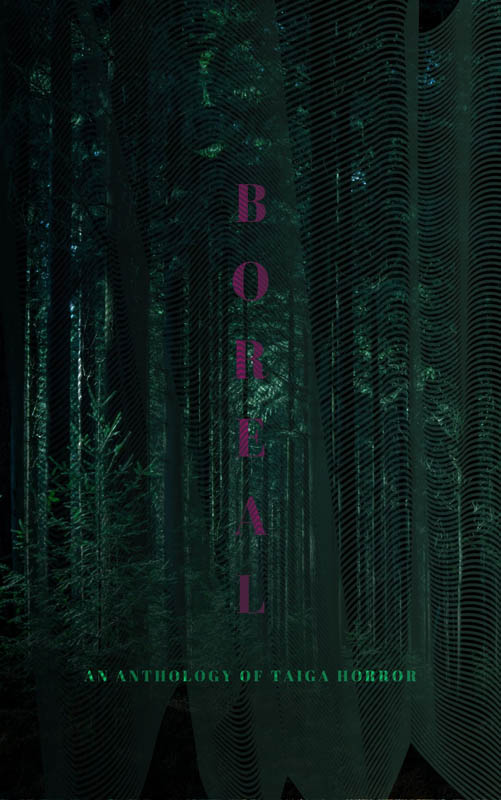
Boreal: an Anthology of Taiga Horror is a collection of twenty-two haunting tales that dwell in the deepest darkest woods and frozen wastelands, edited by Katherine Silva and including Haunted MTL’s very own Daphne Fauber. Each story has even been gifted with its very own poster, hinting at the horrors to be found within it, bestowing a beautiful visual collection as well.
The tales are varied and touch upon the environment in new and different ways, each hearkening to a sort of epiphany or raised awareness. These stories exude both dread and wonder at the smallness of our human existence in contrast to the sacred world we have isolated from, sheltering ourselves in our comfortable houses with centralized heat and everything we could possibly need or want at the ready. The taiga becomes a sanctuary outside of our own dulled awarenesses. It is a holy place imbued with powers beyond mortal human reach, a wilderness that threatens to swallow us – both whole and bit by bit, simultaneously.
The protagonists enter into this realm through ritual, superstition, longing, stubbornness, and their own hubris – yearning to survive its dangers, and to make their own marks upon it. The starkness of their surroundings harbors delicate moments that would be all too easily missed if not deliberately sought or pointed out. The softness of fur, the dappled sunlight shining through trees, the hazy clouds of breath forming in crisp air, the brittleness of bleached bone… those quiet experiences that beg to be forgotten, to lay safely sleeping just below the frozen surface, awaiting spring.
There are those who followed in the footsteps of their predecessors, seeking to escape the constraints of their parent’s and elders’ indoctrination, traditions, madness, and abuse, yearning to find their own way despite also being inextricably bound to their own pasts. There are those who just wanted to go for a walk in the woods, and remained forever changed by what they experienced. There are those who wished to impose their will upon the wilderness, their order falling to disarray, unable to make lasting impact. There are those who sought to leave behind the world of mankind, looking for oneness in the natural order of things through isolation, leaving a bit of themselves behind after being consumed by the terrors they encountered. There are those who truly found communion with the woods, became one with its wildness, and invited its spirit into their hearts to find peace, even at cost of their own lives. And then, there are the spirits themselves…
 (3 / 5)
(3 / 5)
All in all, I give Boreal: an Anthology of Taiga Horror 3.0 Cthulhus. I love existential angst so I found it to be an enjoyable read, and I appreciated the myriad manners in which the biome was explored. But there were points in which I found myself struggling to follow along, as if the words were swept up into their own wilds in ways that alienated myself as reader, as if my mere voyeurism into this otherworldly place was not enough to comprehend the subtle deviations in storytelling mannerisms fully. I suppose in some sense this seems appropriate, but at the same time, it left me feeling a bit unfulfilled, as if I had missed a spiritual connection that should have resonated more deeply.




